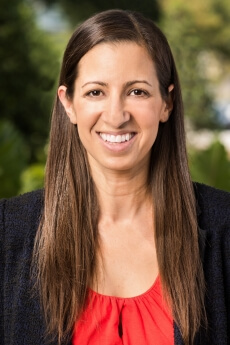
Jessica Steinberg: Focused on Helping Tenants
By Jackie Rogers
Jessica Steinberg’s professional life has been marked by a profound commitment to helping the legally underserved.
From her early days as the sole legal aid housing attorney in San Mateo County, California, this clinical professor at George Washington University Law School has worked on a range of legal issues to promote economic and social justice.
Professor Steinberg’s work in California highlighted for her the many hurdles disadvantaged tenants face when they seek legal remedies from their landlords for housing code violations: fear of landlord retaliation, extended time away from work, and a lack of affordable transportation and child care options all limit opportunities to combat unsafe housing. Moreover, many poor tenants are forced to navigate a confusing and intimidating legal system on their own.
Professor Steinberg’s move to D.C. and transition to academia were part of her commitment to studying and mobilizing support behind new and innovative approaches to improving the legal resources and options available to the underserved.
Establishment of the D.C. Housing Conditions Court in 2010 represented just such an approach, and became the central focus of Professor Steinberg’s careful study for nearly two years.
The Court was set up to address legal issues faced by tenants and to expedite cases for those living in uninhabitable conditions. The Court was born out of widespread agreement that a court with a single focus on housing code violations was needed, as existing city agencies and courts were simply overworked and overburdened.
The D.C. Housing Conditions Court implemented two innovative approaches. First, the court employs field inspectors to investigate alleged violations, rather than requiring tenants to produce proof of unsafe conditions themselves. Second, judicial progress hearings are held until repairs are made, thereby holding landlords more accountable for fixing violations. Professor Steinberg’s research indicates that the Housing Conditions Court is more successful than many traditional courts in addressing habitability issues, and tenants who appear without lawyers are less prejudiced by unfair outcomes.
Professor Steinberg would like to see this D.C. Housing Conditions Court approach expanded to other cities and counties. But she also wants more done to train and inspire the next generation of public interest attorneys and those willing to provide pro bono services.
“The key is to train young law students and lawyers on these issues early in their careers,” she explains. “We need to provide them more direct, hands-on exposure to the many hurdles facing low-income populations.”
As a professor at George Washington University, Professor Steinberg will continue conveying an inspiring message to her students. Her goal is to ensure that “all law students and attorneys understand the special privilege we’ve been afforded as members of the profession, and the obligation that comes with it to fight for justice and equality.”
Jackie Rogers was an intern for Washington Council of Lawyers in 2017.






